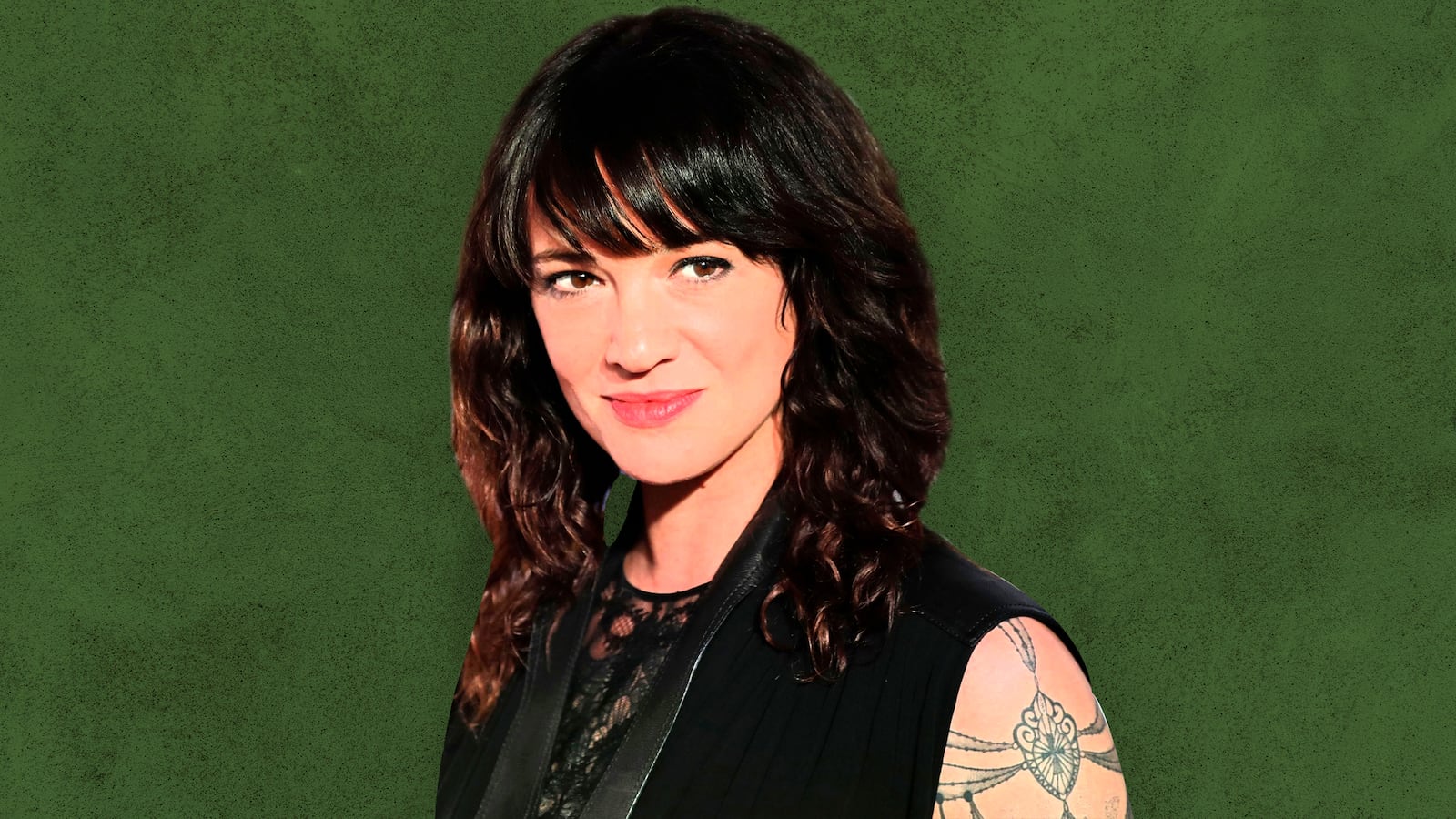This week, The New York Times reported that Jimmy Bennett, a former child actor and musician, had accused Asia Argento of sexually assaulting him when he was 17 and she was 37. Argento reportedly paid Bennett $380,000, ostensibly to silence him, though the legal documents don’t include a non-disclosure agreement, as NDAs are unenforceable in California if the alleged victim is a minor. The Times article included numerous photos from social media that appeared to support Bennett’s account.
The story was shocking, as Argento was one of the first accusers to speak out against Harvey Weinstein and has been a vocal part of the #MeToo movement. The Times reported that she did not respond to questions prior to the article’s publication. When she issued a statement a few days after the Times article was published, she denied Bennett’s accusations and did not address the photos. And, most galling to many people, she claimed that the payoff was the idea of her then-boyfriend, Anthony Bourdain, who recently took his own life. (The Times article did state that Bourdain’s lawyer represented her in the legal negotiations of the payout.)
TMZ subsequently published more photos of the two in bed together, as well as text messages between Argento and a friend that were allegedly sent in the wake of the Times story, in which Argento appears to confirm that she had sex with the boy whom she’d known since he was 7 years old, when he played her son in a 2004 movie she directed, The Heart Is Deceitful Above All Things.
In the text messages, Argento claims the sex was initiated by Bennett and that he’d told her she had been “his fantasy” since he was 12. She included a photo of a note on hotel stationery that appeared to be signed by him, saying how happy he was that they’d reconnected. In his own statement after the TMZ story, Bennett maintained that he was traumatized, and didn’t come forward sooner because he was afraid of how our culture judges male victims of sexual assault.
Those of us who write about and listen to stories of sexual harassment and assault often say that there are no perfect victims. Argento is a prime example. Her alleged experience with Weinstein was detailed in Ronan Farrow’s New Yorker story, including how she continued to see Weinstein after the initial assault and “even grew close to him.” She accepted money from him for her daughter’s child care. That has been used to discredit her.
After Farrow’s story came out, I listened to two people, a man and a woman, both a generation older than me, insist that Argento was not truly a victim. What victim, they said, develops a relationship with her assailant? Many of them, I replied. Why? They couldn’t fathom it. Many reasons, I told them. Victims often don’t want to be victims and tell themselves that if their traumatic experience grows into a relationship, then they weren’t raped. Many victims hate that word; a woman I spoke with who was raped almost two decades ago won’t use it.
In the case of an assailant like Weinstein, power is often a factor. Argento said Weinstein pursued her and she was afraid to anger him because he could “ruin her career.” There’s also the residual trauma: Argento told Farrow that every time she sees Weinstein, “it makes me feel little and stupid and weak.” She feels 21 again, the age she was when he allegedly attacked her, a “little girl.”
Her imperfection is, really, what made Argento a perfect example of a rape victim. Those of us who write about and listen to stories of sexual harassment and assault know how ubiquitous the experience she described is. The way she talked about herself to Farrow, how she “felt responsible.” Little and stupid and weak. “If I were a strong woman,” she told Farrow, “I would have kicked him in the balls and run away.”
After Farrow’s story came out, Argento received widespread backlash in Italy, her home country. She was blamed and derided and accused of attention-seeking. Even here in the U.S., she was one of the more vulnerable Weinstein victims, vulnerable to doubt and dismissal. People who knew more about the dynamics of rape and abuse felt compelled to defend her, as I did.
When Bennett’s accusations first surfaced, I struggled. I had become so defensive of this woman I didn’t even know, this stand-in for all the women whose stories I had listened to, stories I slaved over, taking forever to report, because I was determined not to let them experience the response she had gotten.
There are no perfect victims, after all—the ones I spoke to were rarely an exception to that rule. The thing we talk about less often, but which is equally true, is that there are rarely perfect villains, either.
The vast majority of people who do bad things are not monsters. The Weinsteins of the world are few and far between. And even Weinstein, to those he mentored and nurtured creatively, may not seem a monster. Even he is probably, to some, what most people who commit bad acts are: human, flawed, messed up, and also sometimes kind or generous or righteous.
And yet, so often, we seem incapable of accepting that nuance, holding that dualistic identity in our minds, accepting that both the good and the bad can be true and valid.
Perhaps this is because it frightens us. If there are people who do bad things but are not monsters, how do we protect ourselves? How can we see the bad thing coming, and avoid it, if good-seeming people could be the perpetrator? Or—perhaps even more frightening—how do we know we will not be the one to commit a bad act, to hurt someone else, despite believing that we are not monsters? Are we all capable of hurting others? Are we all destined to do so?
When someone commits rape or murder, it makes sense that we are aghast—and often fascinated. We wonder how a person could do that; we are drawn to conclude that person is a monster and we are not. But this belief that there is any such thing as an absolutely good person or an absolute monster seems, to me, an attempt at finding order in a patently disordered world.
People do bad things for all sorts of reasons, and often because they are repeating bad things that were done to them. Those who read Argento’s accusations against Weinstein probably noticed how similar the encounter Bennett described was to hers: It began with oral sex in a hotel room. And in her text messages to her friend, she mentioned that when she was barely 17, she had a relationship with a man in his 30s. (She also notes the age of consent in Italy, where she had been, is 15; in Los Angeles, where the encounter with Bennett allegedly took place, it is 18.)
Perhaps more upsetting, though, is how much her response mimicked that of Weinstein when his accusers told their stories. She highlighted Bennett’s financial troubles to discredit him. She did not acknowledge her power in relation to him. She did not say, “This is not how I understood our experience, but I am so terribly sorry to learn that Bennett felt this way.” (Of course, his age complicates it all; she could face criminal charges for having sex with a 17-year-old in the state of California.)
The idea that people who are abused sometimes go on to perpetuate the abuse they experienced isn’t new. And perhaps Argento’s Weinsteinian response illustrates how abuse often doesn’t stop after the act itself is over. The fallout itself is traumatic, and how the accused responds can exacerbate the harm.
There are few, if any, monsters, and there are few, if any, heroes—though we seem conditioned to create and revere them. Psychologically, heroes serve a few different purposes. They make us feel safe; they give us an ideal to which we can aspire.

But I am hard-pressed to think of someone idolized who did not ultimately disappoint. Recall F. Scott Fitzgerald: “Show me a hero, and I’ll show you a tragedy.” Perhaps the tragedy is the broken hearts of those who believed in the hero.
To be clear, I am not above this need for heroes. Even as I write this, my fingers type out a disclaimer, a caveat that Bennett’s accusations may not be true. I delete it, remembering how Argento’s denial did not address the photos in the story about Bennett’s allegations. I delete it, remembering how important it is to give victims the benefit of the doubt, especially victims who are less powerful than those they are accusing.
I delete it, because it’s not at all the point.
Every time a complication presents itself, you see who hates the #MeToo movement on some level. They pour out of the woodwork, declaring the movement has finally gone too far, or is dead, or both. They don a cloak of neutrality, the protection of the spectator, as opposed to a participant. It was inevitable, they say.
But it is not inevitable, and it is not happening. A movement is much, much more than the individuals who launched it or participate in it. Maybe that seems cruel, because we spend so much time praising the bravery of people who “come forward,” as we like to say. And they are brave, and they do deserve praise for that.
But a movement is not tangible, the way people are. It is an idea—an ideal. It is the cumbersome, often slow, often jerky, starting-and-stopping transformation of a flawed culture into a slightly better one. It is bigger than us. We carry it, we push it forward, our fingertips might graze it as we surge toward it when someone attempts to stand in the way of its forward motion, its progress. But it barely needs us. Its progress is inevitable, not its destruction.
The women-centered causes that Eric Schneiderman championed are no less important because he has now been accused of being terribly, violently abusive to the women he dated. That Al Franken alllegedly used his celebrity to grope women doesn’t change that the causes he fought for were good and righteous. Aziz Ansari’s questionable behavior in his personal life doesn’t change what he taught us: that brown actors and comedians are just as hilarious as any others, and shouldn’t be limited to playing taxi drivers or convenience store owners. The lines that Louis CK wrote and delivered that made something inside you thrum with recognition of some long-buried ache, some sentimental hurt you avoid—that thrumming is not negated by his repeated disrespect for the women with whom he worked.
And the #MeToo movement is no less valid, no less important, and no less inevitable now that one of its first and most outspoken proponents is even less a perfect victim than we previously thought.





